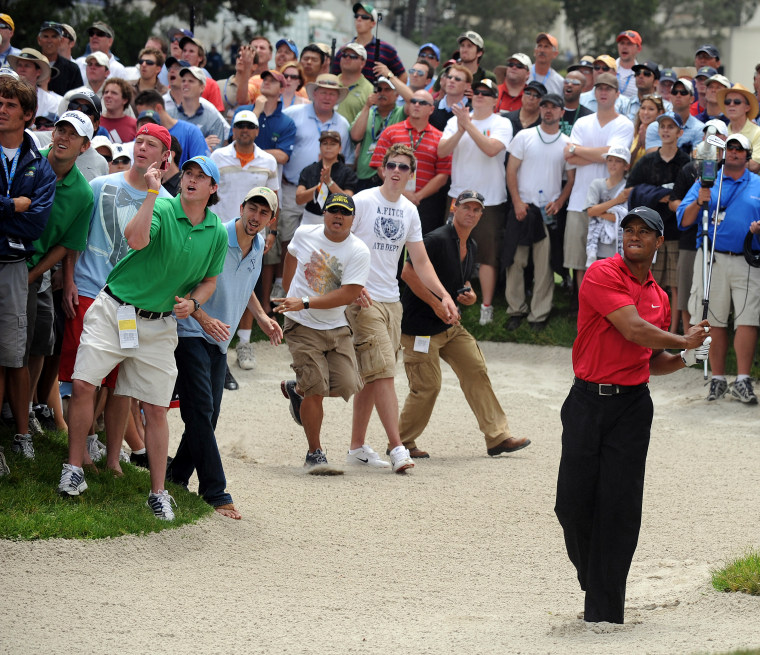At the Internet home of the 137th British Open, found at www.opengolf.com, a picture of a beloved golfer waving to fans graces the top of the home page.
Problem is, that player — Tiger Woods — won't be swinging his clubs at Royal Birkdale three weeks hence, despite having won two of the last three British Opens. He'll be thousands of miles away, resting a knee that gave out after heroic work for 91 holes at the U.S. Open.
A fixture in pro golf for more than a decade, it's hard to believe Tiger Woods will miss not just the British Open, but the PGA Championship, Ryder Cup and every other tournament for the rest of the year. The economic impact of his bad knee on those who have tied their fortunes to him is as tormenting as his pain; tens of millions of dollars will be lost. (On Tuesday, Woods had reconstructive surgery on his left knee.)
Consider Nike, who pays Woods millions of dollars annually to promote its brand (the 32-year-old makes more than $100 million in endorsements a year, more than any athlete). There’s no payoff when the pitchman is invisible to the public. The ever-present swoosh on Woods’ hat, shirt and ball will be gone until 2009, meaning Nike will miss the opportunity to draw viewers’ eyeballs in more than a dozen tournaments. No player attracts more live TV cut-ins during the weekend as Tiger (assuming he's within 10 shots of the top spot).
Buick, too, will lose in a number of ways. Woods has served as a spokesman for the car company since 1999, but it’s doubtful he'll be promoting the product much the remainder of the year, despite a multi-million-dollar paycheck. Woods had committed more than a month ago to this week's Buick Open, driving ticket sales, and the two-time winner had even promised to host a clinic. But he won’t be there. The Buick logo is slapped on Tiger's bag, which now sits in storage. His impact on the company is so big that a Buick-sponsored contest, where Woods would caddie for the winner, had already drawn 50,000 entries, according to the Boston Herald, even though the deadline is September.
Beyond that, for companies that sponsor Tiger, “there is a missed opportunity impact,” says Jim Andrews, senior vice president and editorial director of the IEG Sponsorship Report in Chicago. “These companies may have been able to roll out additional ads or promotions if Tiger won more majors, the FedEx Cup or achieved some other milestone this year.”
Attendance at PGA Tour events is sure to drop, perhaps by thousands of fans a round, which will also decrease merchandise and concession sales. No doubt television ratings will fall without Tiger's star power. His U.S. Open playoff with Rocco Mediate on June 16 was the most-watched golf event on cable ever, according to SportsBusiness Daily, and it can be guaranteed a playoff without him would not have drawn five million viewers on a workday — as the Monday round did. Though plenty of advertising slots have been sold in advance of remaining tournaments, the prices are also tied to a ratings expectation, one which will suffer without Woods' presence.
Other entities will feel less discomfort from Woods' season-ending knee surgery. Corporate hospitality tents are often secured months in advance; plus, its denizens rarely are lured simply by the chance to see Tiger walk by the tent. Sales of golf videogames may be hurt a bit, especially the “Tiger Woods PGA Tour ‘09” version, due to be released in August by EA Sports.
Of course, one group stands to benefit economically from the absence of the world's best player: pro golfers. Without Woods, first place — and the hefty cash that comes with such a finish — is more wide open than it has been since 1996. Golfers previously unknown by fans because they stalked Tiger will get a fresh look, which will also aid their sponsors.
And there’s one other slice of good news: the Tiger return. Think of the frenzy that will take place in 2009 when he re-emerges at the Northern Trust Open or some other tournament. Companies such as Gatorade — which launched a line of Tiger drinks this spring — could take advantage by running spots around his return.
Until then, though, there’ll be a void on the course — and in the revenues around golf.
